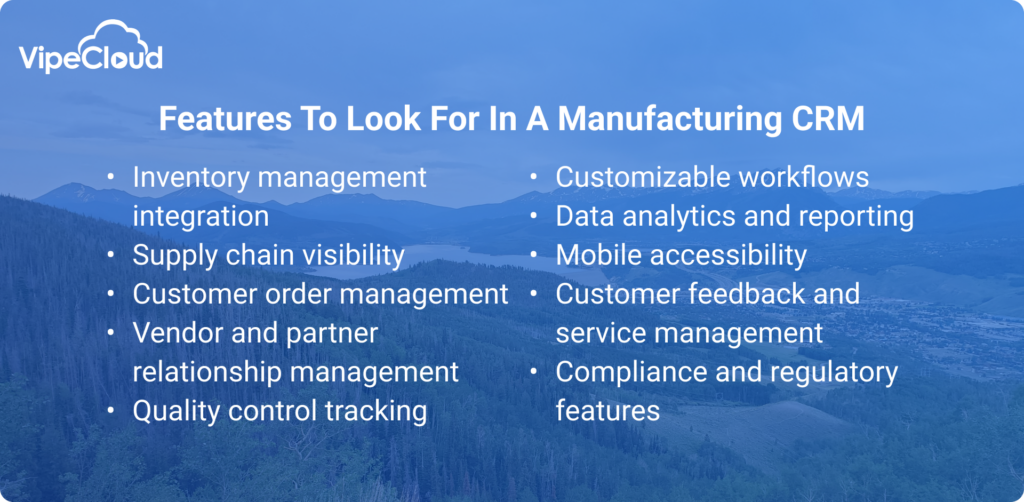Last updated on March 19th, 2024

Looking for a CRM for your manufacturing company? This guide reviews 3 top manufacturing CRMs to consider – no matter the size of your company.
The manufacturing industry is all about precision and efficiency…
But excellence isn’t just about building quality products. It’s also about building quality relationships.
That’s where manufacturing CRM comes in.
Today’s manufacturers need CRMs to understand and juggle quotes, orders, production, and delivery.
Whether you’re facing inefficiencies in current processes or simply looking for a way to improve customer relationships in your manufacturing company, we’ve rounded up the best CRM solutions for manufacturing.
Feel free to skip to the section you’re most interested in:
- What Is CRM For Manufacturing
- Best For Value: VipeCloud
- Best For Large Businesses: Odoo
- Best For In-Depth Analytics: Dynamics 365
- CRM Evaluation Checklist

VipeCloud is the only Automation tool your small business needs to
be the hero to your customers.
With Email, Texting, Social, Suites, Chat, Stories, Video Email & Sign Up Forms fully built-in, we provide you with the perfect platform to grow your business.
15 Day Free Trial – Get started risk free. No CC needed.
What Is CRM For Manufacturing?
Customer Relationship Management (CRM) software tailored for manufacturing goes beyond managing contacts and sales pipelines.
Manufacturing CRMs understand the unique complexities of the industry, offering features like:
- Inventory management – To track raw materials, finished goods, and work-in-progress in real-time.
- Production planning and scheduling – Optimize production schedules to meet demand while considering materials and equipment availability.
- Quality control – Manage quality checks, non-conformance reports, and corrective actions throughout the production process.
- Project management – Collaborate on projects, track progress, and manage deadlines effectively.
- Machine integration – Connect with CNC machines and other equipment to collect real-time data for accurate production forecasting and maintenance planning.
With these capabilities, manufacturing CRMs empower businesses to:
- Convert leads faster, nurture customer relationships, and personalize marketing campaigns.
- Streamline production processes, reduce waste, and optimize resource utilization.
- Deliver exceptional service, respond to inquiries promptly, and resolve issues efficiently.
1. Best For Value: VipeCloud
VipeCloud is an all-in-one CRM made for small and medium-sized businesses to track and automate sales, marketing, project management, and customer relationships on a single platform.
VipeCloud is a great value CRM with support that customers rave about on Capterra (with 4.8 stars!).
Although VipeCloud isn’t specifically made for manufacturing companies, its features are highly adaptable to any industry.
Pros
Highly customizable workflows, flexible pricing plans, built-in project management, and excellent user interface.
- Excellent for email marketing using its automation and pre-made templates
- Great for multi-channel communication (social, SMS, and email)
- User-friendly with a simple interface
- Customers love VipeCloud’s personal and prompt customer support
- Very affordable and scalable compared to other CRMs on this list
Cons
- Some new users need help from customer support to understand how all of the features work.
- Not made for manufacturing, although many of its features can be adapted.
Features
We recommend checking out VipeCloud’s full list of features here.
However, here are some of VipeCloud’s most important features for manufacturing companies:
- Email Automation – Streamlines communication with customers and suppliers, saving time.
- Email Newsletters – Effective for sharing updates, new product launches, or industry insights.
- Contact Segmentation – Allows targeted communication based on customer or vendor categories.
- Sign Up Forms – Useful for lead generation and collecting information at trade shows or events.
- Social Sharing – Automate your social posting for a better social media presence.
- Video Email – Offers a more engaging way to communicate complex product information or updates.
- CRM – Centralizes customer data, improving relationship management and sales tracking.
- Mobile app – VipeClouds allows users to access the most important CRM features from their mobile device.
- Visual Pipelines – Provides clear visualization of sales or production processes.
- Task Management – Helps in organizing and tracking manufacturing-related tasks and projects.
- Customizable Tasks, Workflows, Fields, and Pipelines – Flexibility to tailor the system to specific manufacturing processes.
- Contact Scoring – Assists in prioritizing leads or customers based on engagement or potential value.
- Estimates – Streamlines the quote creation process for custom manufacturing orders.
- Reports – Offers insights into sales performance, customer engagement, and other key metrics.
- Scheduler – Useful for planning and tracking meetings, deliveries, and production schedules.
- Email Integration – Simplifies communication by integrating with existing email platforms.
- QuickBooks Integration – Facilitates financial management and invoicing.
- Social Platforms Integration – Streamlines managing social media marketing campaigns.
- Zapier Integration – Allows integration with a wide range of other business tools.
Pricing
$20 to $80 per user/month paid annually across 4 plans.
For full pricing plan details, visit our pricing page.
Reviews
“Vipecloud enables us to do a multitude of different things with our customer database — everything from contact management to email marketing and even to tracking opportunities. It’s one of the best on the market.” – Usha K.
2. Best For Large Businesses: Odoo
Odoo stands out with its modular structure (it’s open source), offering a comprehensive suite of business management applications, including CRM and MRP.
Odoo seamlessly integrates with other modules like inventory, purchasing, and production management.
If you’re looking for a customizable and scalable CRM that is tailored to manufacturing, then consider Odoo.
Pros
- Has an easy-to-navigate user interface, making it easy to find specific functions
- Has applications specifically made for manufacturing
- Offers fast and flexible search capabilities
- Provides integrated apps for CRM, MRP, eCommerce, accounting, and more, and is open-source, allowing for private server hosting.
Cons
- Customization can be challenging without in-depth documentation, which is not always publicly available.
- The software, being written in Python, might present limitations for some users.
Features
- Management – For manufacturing orders, work orders, barcodes, repair orders, editable MOs, and unbilled orders.
- Scheduling and planning – Plan manufacturing, organize work orders, manage bill of materials, and schedule work based on capacity and OEE.
- Flexible master data – Create multi-level bills of materials, create new routings for work orders, add configurable options for orders, and sell products in kits.
- PLM – Track changes between versions, track engineering changes, and store plans.
- Quality control – Automatically trigger quality checks.
- Maintenance – Schedule and automate maintenance schedules.
- Workcenter control panels – Use tablets to display worksheets, set alerts, record production, and define work order steps.
- Reporting – Trace components used in manufacturing processes, track costs, and analyze overall equipment effectiveness.
Pricing
They have a free version for one app only. Paid plans start at $24.90 per user/month.
Reviews
Keebler R. mentioned liking these aspects of Odoo in a customer review:
“The straight forward nature of the software and how it is linked with all of the other modules.
The ability to keep up with serial numbers or lots.
Reservation of inventory to all of the products on the line items.
Being able to link inventory items to the breakdown of components.”
3. Best For Analytics: Dynamics 365
Dynamics 365 is ideal for enterprises that need a lot of advanced features.
In other words, this is one of the most robust CRMs for manufacturing on this list, and it comes with a bigger price tag.
Small companies probably will find implementation, adoption, and costs to be more difficult.
Pros
- In-depth insights and analytics into business operations
- Made for enterprises
- Consolidates your customer and business data in one place
- Highly customizable
Cons
- May require technical expertise to customize to your needs.
- Steeper learning curve, especially for those not familiar with Microsoft’s suite of products.
- High cost of ownership, especially for small to mid-sized businesses.
Features
- Supply chain management – Optimize inventory, streamline production, and improve overall supply chain efficiency.
- Customer insights – In-depth data analysis to better understand customer behavior and preferences.
- Remote assist – Enables remote troubleshooting and assistance, reducing downtime and improving maintenance efficiency.
- Finance – Streamline financial processes, improve reporting accuracy, and enhance budget management to overcome supply disruptions.
- Customer service – Improve customer engagement and service quality through better data management and communication tools.
- Guides – Enhance safety and productivity, minimize errors, and ensure compliance with interactive, hands-free instructions for work processes.
- Field service – Schedule predictive maintenance and optimize your resources.
- Sales – Do production planning that aligns with customer demand and inventory.
Pricing
Unless you’re an enterprise, you’ll likely find Dynamics 365 expensive. We recommend looking at their pricing page and contacting them for a custom quote.
Reviews
Here’s what Youssef had to say about using Dynamics 365:
“Dynamics 365 presents an all-encompassing solution that seamlessly integrates CRM and ERP functionalities, fostering enhanced business processes and customer relationships. The platform’s ability to merge multiple business aspects into one unified system is incredibly beneficial, streamlining operations and promoting a holistic approach to customer engagement. However, the initial learning curve due to the complexity of the user interface may pose challenges for new users, requiring dedicated time for familiarization and full utilization of its potential. Once past this learning phase, the platform proves to be an invaluable asset for businesses seeking to consolidate and optimize their operations.”
CRM Evaluation Checklist For The Manufacturing Industry
Exploring these CRMs for manufacturing is a crucial step toward improving efficiency, building stronger customer relationships, and staying competitive.
While there’s probably no perfect out-of-the-box manufacturing CRM solution in the market, here are some features that you might want to consider looking for:

- Inventory management integration – Streamlines inventory control and production planning.
- Supply chain visibility – Offers comprehensive visibility into the supply chain and enhances decision-making and responsiveness to market changes.
- Customer order management – Allows users to manage customer orders and production scheduling to ensure timely fulfillment of customer demands.
- Vendor and partner relationship management – Track and communicate with vendors and partners to improve supply chain efficiency and resource optimization.
- Quality control tracking – Track quality control throughout the production process to ensure product consistency and compliance.
- Customizable workflows – Customize your CRM to fit specific manufacturing processes.
- Data analytics and reporting – Gather and track insights for strategic planning and continuous improvement.
- Mobile Accessibility – Field staff and management should be able to access their CRM on the go.
- Customer feedback and service management – Manage customer service and collect feedback to make sure customers are satisfied and improve product quality.
- Compliance and regulatory features – Supports compliance with industry standards and regulations, such as safety standards.
If you want to learn more about how to evaluate a CRM, we recommend checking out our CRM evaluation guide.
How Can VipeCloud Help The Manufacturing Industry?
VipeCloud offers an all-in-one CRM solution with highly customizable workflows, built-in project management, and an easy-to-navigate user interface.
If you’re looking for a CRM for manufacturing without the big price tag of more specialized CRMs, consider trying our 15-day free trial.
Prefer to talk to a human to see if VipeCloud is the right fit for your company? Schedule a demo with us. We’ll be happy to help.

Leave a Reply